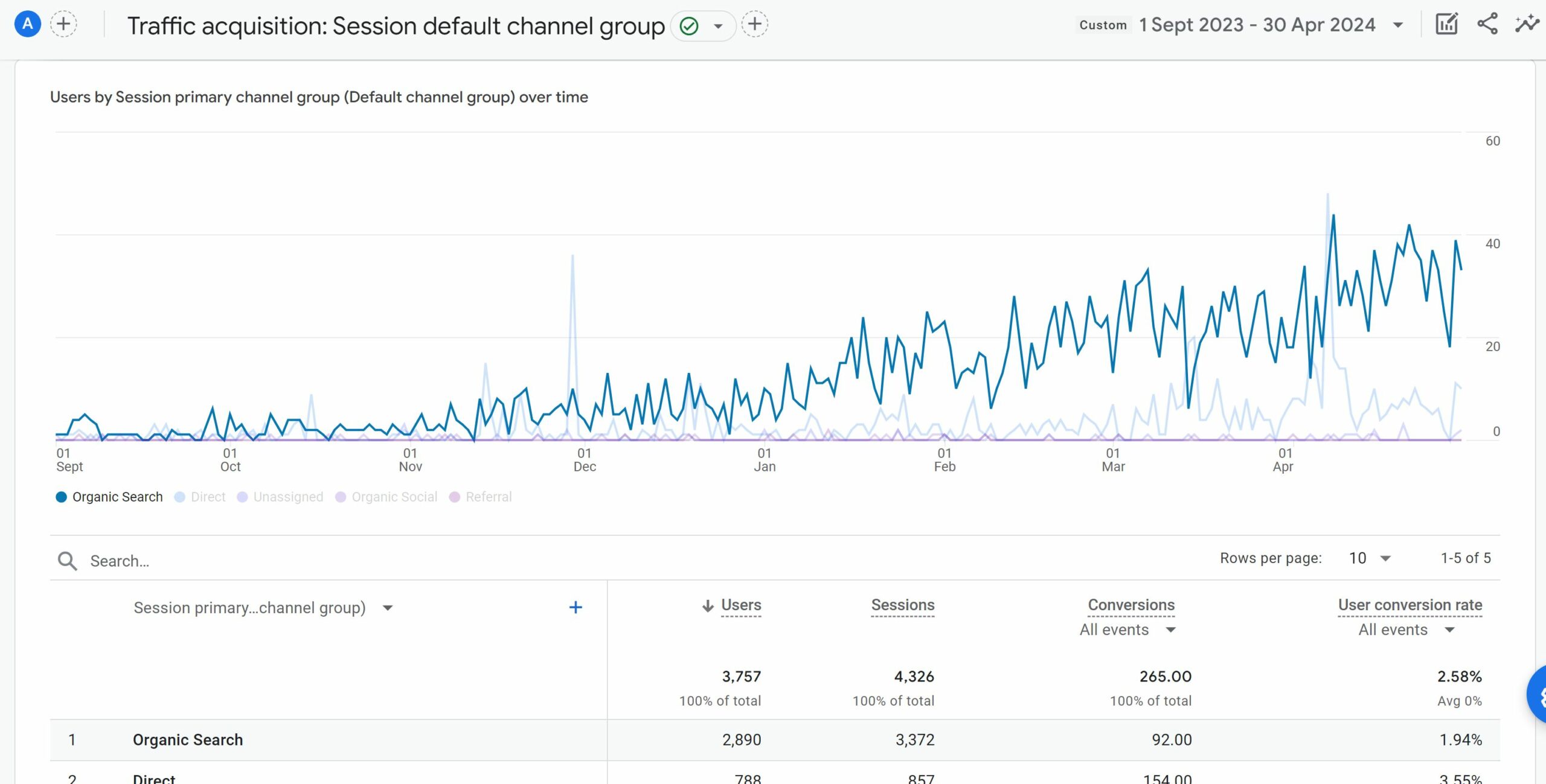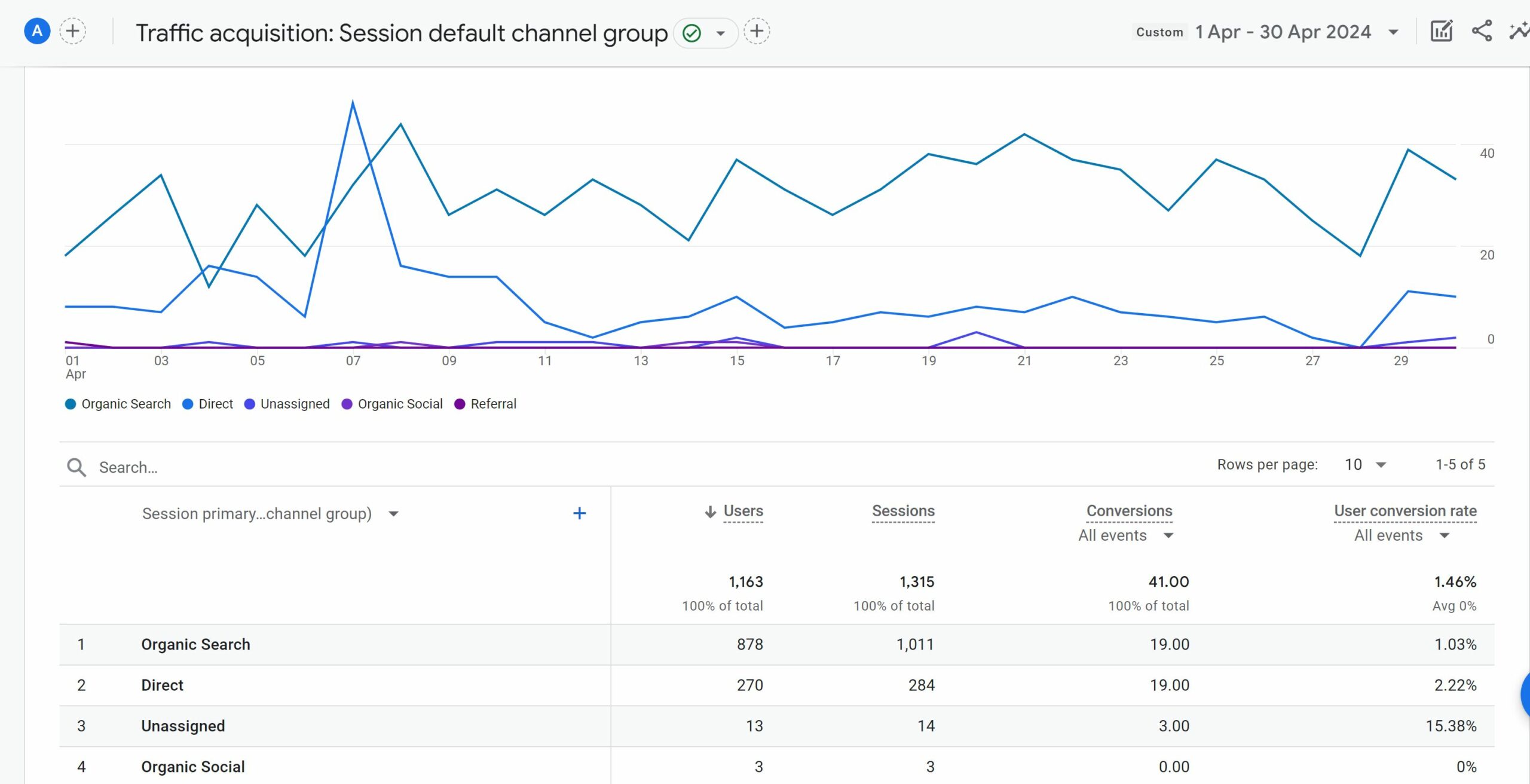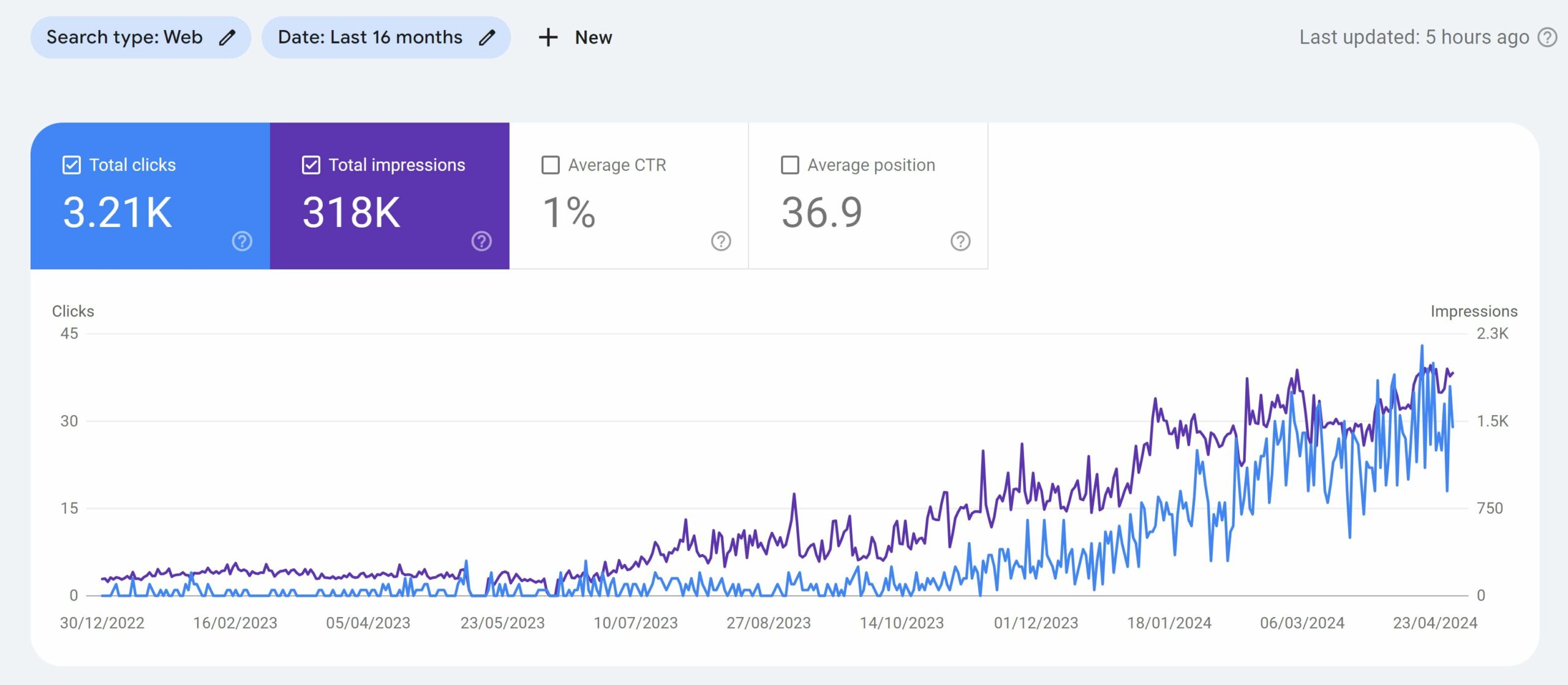Are you trying to get more customers for your business with SEO?
As an Auckland SEO agency, we recently helped a plumber in Auckland to go from 0 to 850 organic website visitors per month through SEO and grow his business.
Here’s how we did it.
Proof Of SEO Results
Before I show you how I did it I want to show you some proof this actually happened.
Here are some screenshots from Google Analytics and Google Search Console showing the increase:



You can see that in April 2024, they had 878 users from organic search. All the graphs clearly show that in mid 2023 they were getting next to no traffic at all.
How I Did It: The SEO Process
Here is the plumber SEO process I used to get the website ranking and increase the organic traffic so much in such a short space of time.
Keyword Research
Keyword research is the absolutely critical first step of any SEO campaign.
I starting with identifying primary keywords we wanted to go after, like “Auckland plumber”, “drainage Auckland” and “hot water cylinders”.
I identified all the commercial intent keywords that we likely to get them jobs, and focused all the services pages to optimise for those.
I also identified all the subservices that needed to go under each section. For example, under Drainage, we have things like Stormwater Drainage and Subsoil Drainage.
While these may not be the main keywords, they’re still significant and we needed to make pages on them.
By creating separate pages for these subtopics, you stand a chance at ranking for those keywords, as well as increase your website’s topical relevance, which Google values.
Competitor Research
Through competitor research, you can pinpoint their strengths and weaknesses, turning this knowledge to your benefit.
You can also use your competitors to identify other keywords you may have overlooked, which is exactly what I did here. They are also a goldmine for content ideas, which we will go into later.
Start by identifying your primary competitors. Search for the keywords you plan to target to find the highest ranking rivals.
Then, dig deeper.
Go over their website, specifically their sitemap and their Services pages, and see what content they have.
This will give you an idea of the content and keywords you will need to have on your website also.
After collecting this data, analyse it thoroughly. Learn from your competitors’ successful strategies and consider how to adapt them for your site.
Also pay attention to what they don’t have.
You will find that only some sites have content about a certain subtopic, other sites have other subtopics, but rarely does one site have it all.
This is your opportunity to become that one site and dominate the niche.
Creating Money Pages
Once you’ve got your topics and keywords, and you know what your competitors are doing, the next important step in the SEO process is creating ‘money pages.’
These are the pages on your website that will generate revenue, either directly or indirectly. They’re typically product pages, service pages, or even informative articles that lead to a conversion.
In this case, they were all the services pages for the plumbing business.
Concentrate on developing valuable content for these pages which gets people to want to buy.
Explain the benefits of your service and what you offer, and why you are better than the competition.
Your content should be engaging, informative, and optimised for both search engines and users.
You also want to include as much social proof as possible, whether that’s testimonials, work you’ve done for clients, or other ways to show that people are happy with your services.
Make sure to include a clear call-to-action, prompting visitors to make a purchase or get in contact for more information.
Lastly, optimise your money pages for technical SEO by correctly implementing header tags, meta titles, and URLs that incorporate your target keywords.
Take your time with this stage. Your money pages are the core of your SEO strategy.
SEO Content Strategy
Once your money pages are complete, you want to start posting content about these topics.
This is where the keyword and competitor research will come in handy.
You should already have a large list of topics you can post about for each of your service areas.
This will help to not only drive more traffic to your site as you rank for long tail keywords, but will increase your topical authority and help your money pages rank.
You want to make sure to include internal links from these blogs to the main money pages (make sure they are relevant – so a plumbing blog will link to the plumbing page etc).
Remember to make the content engaging and answer the intent of the keyword you are optimising for.
Don’t just pump out a bunch of random AI content that doesn’t address the intent of the search. This is not a good long term strategy and they likely won’t rank at all, or even get deindexed.
Citations & Directories
Citations, which include your business name, address, and phone number mentioned across the web, are essential for improving local SEO.
Directories are online listings where your business details are categorised. They are sites like Finda, Hotfrog and Yelp.
Both of these will help to establish your brand across the internet and get Google to recognise you as a “real” business rather than just some random website.
This will, in turn, help to increase your rankings and get your Google Business Profile to show up in the local results also.
To harness the benefits of citations and directories, it’s crucial to ensure that your business information is accurate and consistent on all platforms.
Inconsistencies can confuse search engines and potential customers.
Additionally, focus on reputable and relevant directories. Specialised directories, in particular, can help you target your audience more efficiently. Don’t focus so much on volume, as making directory listings on spammy sites will not do you any favours.
Also, don’t overlook the impact of reviews, especially on Google!
Many directories allow customers to leave feedback, which can significantly influence your business’s reputation. Remember, effective SEO isn’t just about visibility; it also builds credibility.
Social Profiles
Your company’s social profiles can be valuable assets in your SEO strategy, driving traffic to your website and enhancing your online presence.
They provide additional platforms for potential customers to discover your offerings, learn more about your products or services, and ultimately navigate to your website.
More importantly, they spread your brand across the internet, further establishing you as a real business.
Including links to your website in your social profiles also aids your SEO. While they won’t directly help you rank, it can help drive traffic from these social platforms which does help.
Ideally, try to keep your social profiles active, as social signals are becoming more important for SEO.
Conclusion
This is the exact process I used to help this plumber rank and get more jobs.
If you want someone to do this for you and help you get more business, book a call with me today!

